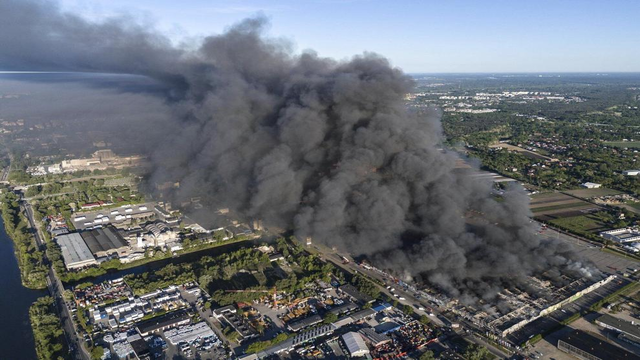
A fire burns from a vast shopping complex in Warsaw, Poland, May 12, 2024. (AP Photo)
Poland has ordered the closure of the Russian Consulate in Krakow following an investigation that implicated Moscow in an arson attack. The fire, which devastated a shopping center in Warsaw last year, is said to be part of a larger effort to destabilize the region.
The Arson Attack That Sparked Controversy
On May 12, 2024, a massive fire broke out in the Marywilska 44 shopping center, located in a northern district of Warsaw. The facility housed around 1,400 shops and services, many of which were run by the Vietnamese community. Miraculously, no one was injured, but the damage was extensive. Foreign Minister Radek Sikorski called the incident “unacceptable” and held Russia accountable for the attack. He also announced that Poland would expel the Russian Consulate from Krakow.
Accusations and Legal Action
Polish authorities have pressed charges against two Ukrainian nationals, Daniil B. and Oleksander V., for allegedly collaborating with the individuals responsible for the arson. The national prosecutor’s office stated that these individuals were working with parties linked to Moscow. This marks the latest development in an ongoing investigation into Russian influence in destabilizing European countries.
Russia Denies the Claims
Kremlin spokesman Dmitry Peskov quickly responded to Poland’s actions, calling the accusations baseless. He described the claims as rooted in anti-Russia sentiment and suggested that Poland’s decision to shut down the consulate would only harm already tense relations between the two nations. “Poland is choosing hostility against us,” Peskov stated, emphasizing that the diplomatic ties between Russia and Poland are already in a “deplorable state.”
A Pattern of Aggression
This move comes after a series of similar actions by Poland. Last year, Sikorski ordered the closure of another Russian Consulate in Poznan, citing sabotage and arson attacks linked to Moscow. With the closure of the Krakow consulate, Russia now only maintains a single consulate in Poland, located in Gdansk.
Rising Tensions in Eastern Europe
The recent developments are part of growing concerns over Russia’s covert operations in Europe. Countries along NATO’s eastern borders, including Poland and the Baltic states, feel increasingly vulnerable to Russian interference. Earlier this year, Lithuania accused Russia of carrying out an arson attack at an IKEA store in Vilnius, further heightening regional tensions.
Poland’s Stance on Security
As the situation unfolds, Poland has made it clear that it will take further action if Russian provocations continue. Foreign Minister Sikorski emphasized that Poland would not tolerate such attacks and would defend its national security at all costs. The closure of the Russian Consulate is a strong statement from Warsaw, signaling its determination to protect its citizens from foreign interference.
Conclusion: A Cold Diplomatic Landscape
The expulsion of the Russian Consulate is a significant step in the ongoing geopolitical tensions between Poland and Russia. With rising fears of Russian destabilizing efforts in Eastern Europe, Poland is taking a firm stance to safeguard its sovereignty. The situation remains fluid, and the coming months could see further diplomatic and legal measures as countries along NATO’s eastern flank brace for potential Russian aggression.















